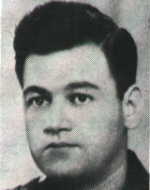Son of-Eliezer and Sofia. He was born in Tel Aviv and studied at the Katznelson Elementary School in Givatayim, where he was a diligent, serious student and liked all of his friends, and his teachers praised him for being intelligent and gifted with a good memory. He studied at the Ohel Shem High School in Ramat Gan and completed high school at the Shalva School in Tel Aviv, where he was active in the Scouts movement and until his enlistment in the IDF was a friend In the Ramat Gan Scouts troop. Within the framework of the tribe, he underwent a course for counselors and at a young age reached the rank of head of battalion in the movement. He devoted his best energies to guidance, and his most prominent feature, which was revealed at that time, was the desire to help and ease people, in good spirit and with patience. In the field of training he served as a model for his apprentices and received great respect from the tribal leaders. Uri devoted most of his time to reading and acquiring knowledge in the theoretical fields. He was interested and was alert to what was going on around him and what was going on in the world, especially in his country. He bought books on subjects that interested him. He was active in the IDF, and was drafted into the IDF in early September 1953, and the army opened up a new world. Three years after his enlistment he joined the permanent army (September 1956). Since he was never deterred by difficulties and always aspired to increase his knowledge, Uri tried to go to as many courses as possible. After completing the officers ‘training course, he underwent an officers’ course, followed by a course for paratroopers and small combat, followed by a course for infantry commanders in the infantry corps, an advanced infantry course, and after that he graduated from the Command and Staff School. In the Faculty of Political Science and Middle Eastern Studies and received a BA (BA). Because of his interest in the history of the War of Independence he underwent a training course on this subject, and in addition he underwent an educational training course for commanders. He participated in the Sinai Campaign and the Six-Day War. In the IDF, his activities were varied and varied: training, research, operations and finally commanding the unit of minorities, whose people, Druze and Circassians loved and devoted the best of his energy and love. He did not boast of his deeds and achievements, and although he left his mark wherever he went, he did his deeds with humility and humility. And on his own and his willingness to solve difficult and complex problems On the 14th of Iyar 5742 (28.4.1972), he died during his service as commander of the Minorities Unit Lt. Gen. (res.) Lt. Gen. (Res.) Lt. Gen. (res.) Lt. Gen. (res.) Lt. Gen. (res. In the eulogy, the head of the Kfar Kama local council said: “I knew Uri as a commander who loved his unit and did it for her. In a condolence letter to Uri’s wife, one of the Druze parents wrote: “Personally, I believe in a saying that says:” Hashem gave and the Lord took. “But despite this statement, I remained amazed – and so did many of his friends and acquaintances And the Druze community – because Uri was not just a commander but a man, a friend and a soldier – – – Only a few days ago we participated together in remembrance of the heroes of the Druze unit that Uri Himself commanded her – – – His image was always smiling and full of action and energy – – – I say to Uri’s parents: Your loss is great, very great, and my people see your loss as our loss, because the young and fresh branch that was cut off from your race was for us the tree that struck deep roots within us. And to her dear wife: I would like to be a poet so that I can comfort you; “The commander of the minority unit Uri played for us all the virtues and advantages – the candor, the integrity, the integrity, the integrity and the integrity of the people.” A man and an officer, a conscientious backbone, capable of standing well against the gusts of competing interests, the ability to command, and the characteristics of a field commander. In his relations with his soldiers and members of the communities, he represented the image of the Israeli officer in his best form and essence. For this he was praised, respected and honored. I was always a pleasant, intelligent, intelligent and self-confident conversationalist. “In July 1972, the Unit’s headquarters published the” Unit Newsletter “containing an article about Uri, in other articles about the fallen. It says that Uri did command the whole unit for a relatively short period, but managed to make its mark on it. It also said: “He cared and worked tirelessly to raise the value of the unit, its fighting ability, and the morale of its soldiers – – – Uri had wonderful personal qualities and one of them was undoubtedly his peace of mind. The “Soldiers Club” in Tel Aviv renamed the Officers ‘Club in the Central Soldier’s House after its name, and it was named “The Officers’ Club named after the late Lieutenant General Uri Simon.” The Druze unit donated a trophy for his achievements in sports.
